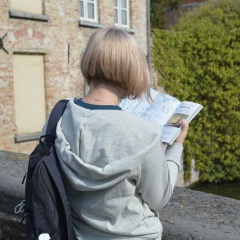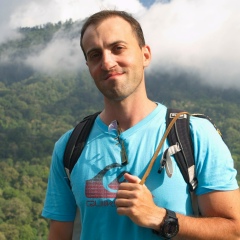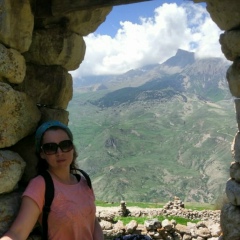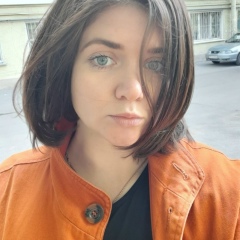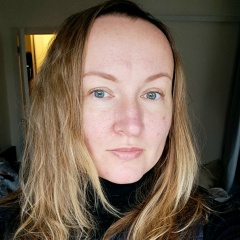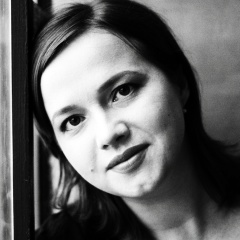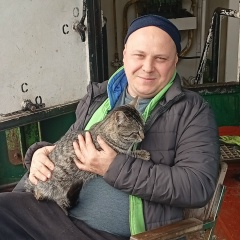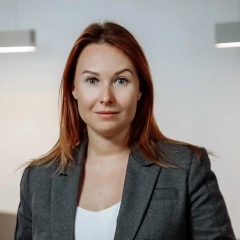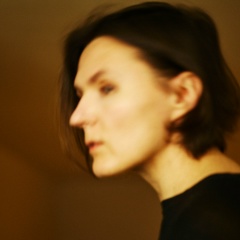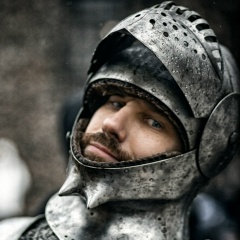ВСЕ, ЧТО ВОКРУГ - ТВОЕ, СОЛДАТ
У меня перед глазами - мой прадед, Илья Филиппович Рясков. Мне 10 лет, я только проснулся, а он уже вовсю косит траву перед деревенским домом в Нижнем Карачане. Прикуривает самокрутку, несет ведро с водой. Так сразу и не скажешь, что у него нет одной руки - он потерял ее на Курской дуге, на минном поле.
У меня перед глазами моя прабабушка, Александра Ряскова. Мне 12 лет, и мы идем рядом с ней по центральной улице Нижнего Карачана, а за нами едет машина, в которой - гроб с телом прадеда. Хоронили его всем селом, и впереди процессии могли бы нести его награды - если бы они сохранились. Но Илья Филиппович все медали, что были, раздал детям - и больше не принимал от государства ни квартир, ни машин, ни других почестей. Говорил - мне машина, а тем, кто там, под Курском остался - им что?
У меня перед глазами мой дед, Василий Ильич Рясков. Мне 15 лет, в голове - бунт против всего и всех, девчонки и хард-рок. Только из уважения я слушаю рассказы деда о том, как он ждал папу с фронта, как в деревенской школе писали на газетах - потому что все, даже бумага, было дефицитом. Как с мамой снимали искалеченного отца с санитарного поезда и потом выхаживали дома, снова и снова отстирывая бинты, потому что новых не было. И прошло еще немало лет, прежде чем я вдруг заметил слезы в глазах деда, когда он все это мне рассказывал - снова и снова, год за годом. И вот мне уже почти сорок, и прямо сейчас я пойду покурю, потому что плакать мужчине как-то не к лицу.
У меня перед глазами моя бабушка, Вера Николаевна Ряскова. Мне почти сорок, я до сих пор почти ничего не знаю о ее детстве - потому что она до сих пор почти ничего не рассказывает. Потому что я даже не представляю, как это можно пережить - начало блокады, эвакуацию, гибель родителей, после войны - детский дом. И жизнь, которую надо было строить своими руками, своими силами. И они эту жизнь построили, и страну отстроили заново. И родили двоих детей, и теперь у нас - огромная и счастливая семья.
У меня перед глазами фотография моего деда, Анатолия Георгиевича Загацкого. Я его никогда не видел, потому что он погиб в железнодорожной катастрофе за 22 года до моего рождения. Но я держал в руках его кисти и штихели - он был художником-оформителем и фотографом. А еще у меня есть несколько наградных листов на его имя. Благодаря им я знаю, что в 44-м году Анатолий Георгиевич закончил войну в венгерском городе Чонграде, где, будучи командиром артиллерийской батареи, выбивал врага из зданий, превращенных в огневые точки. Был тяжело ранен, и всю оставшуюся жизнь мучился из-за болей в пробитых осколками ногах.
У меня перед глазами моя бабушка, Клара Владимировна Загацкая. Мне лет 7-8, меня оставили у нее ночевать, и вот вечером, уже перед самым сном, бабушка достает откуда-то из глубин шкафа серенький потертый блокнот, начинает мне его читать, плачет, закрывает и убирает обратно. Пройдет много лет, прежде чем я узнаю тайну этого блокнота - это дневник, который бабушка вела в блокадном Ленинграде - с первых дней осады города и до эвакуации в 1943-м. До сих пор то, что там написано, кажется мне какой-то мрачной повестью, выдуманной талантливым писателем, чтобы как следует напугать читателя.
У меня перед глазами сотни солдат, чьих имен я не знаю. Каждый год мы встречаем их в лесных окопах, траншеях, воронках - там, где восемь десятилетий назад их застала смерть.
Я буду отмечать день Победы, несмотря на все мракобесие и стыд, которыми в последние годы наполнен этот праздник. Буду отмечать вместе живыми и мертвыми, вернувшимися и пропавшими без вести, пережившими весь тот ужас и нашедшими в себе силы все начать заново.
Конечно, прошел почти целый век.
Но все, что вокруг - ваше, солдаты.
У меня перед глазами - мой прадед, Илья Филиппович Рясков. Мне 10 лет, я только проснулся, а он уже вовсю косит траву перед деревенским домом в Нижнем Карачане. Прикуривает самокрутку, несет ведро с водой. Так сразу и не скажешь, что у него нет одной руки - он потерял ее на Курской дуге, на минном поле.
У меня перед глазами моя прабабушка, Александра Ряскова. Мне 12 лет, и мы идем рядом с ней по центральной улице Нижнего Карачана, а за нами едет машина, в которой - гроб с телом прадеда. Хоронили его всем селом, и впереди процессии могли бы нести его награды - если бы они сохранились. Но Илья Филиппович все медали, что были, раздал детям - и больше не принимал от государства ни квартир, ни машин, ни других почестей. Говорил - мне машина, а тем, кто там, под Курском остался - им что?
У меня перед глазами мой дед, Василий Ильич Рясков. Мне 15 лет, в голове - бунт против всего и всех, девчонки и хард-рок. Только из уважения я слушаю рассказы деда о том, как он ждал папу с фронта, как в деревенской школе писали на газетах - потому что все, даже бумага, было дефицитом. Как с мамой снимали искалеченного отца с санитарного поезда и потом выхаживали дома, снова и снова отстирывая бинты, потому что новых не было. И прошло еще немало лет, прежде чем я вдруг заметил слезы в глазах деда, когда он все это мне рассказывал - снова и снова, год за годом. И вот мне уже почти сорок, и прямо сейчас я пойду покурю, потому что плакать мужчине как-то не к лицу.
У меня перед глазами моя бабушка, Вера Николаевна Ряскова. Мне почти сорок, я до сих пор почти ничего не знаю о ее детстве - потому что она до сих пор почти ничего не рассказывает. Потому что я даже не представляю, как это можно пережить - начало блокады, эвакуацию, гибель родителей, после войны - детский дом. И жизнь, которую надо было строить своими руками, своими силами. И они эту жизнь построили, и страну отстроили заново. И родили двоих детей, и теперь у нас - огромная и счастливая семья.
У меня перед глазами фотография моего деда, Анатолия Георгиевича Загацкого. Я его никогда не видел, потому что он погиб в железнодорожной катастрофе за 22 года до моего рождения. Но я держал в руках его кисти и штихели - он был художником-оформителем и фотографом. А еще у меня есть несколько наградных листов на его имя. Благодаря им я знаю, что в 44-м году Анатолий Георгиевич закончил войну в венгерском городе Чонграде, где, будучи командиром артиллерийской батареи, выбивал врага из зданий, превращенных в огневые точки. Был тяжело ранен, и всю оставшуюся жизнь мучился из-за болей в пробитых осколками ногах.
У меня перед глазами моя бабушка, Клара Владимировна Загацкая. Мне лет 7-8, меня оставили у нее ночевать, и вот вечером, уже перед самым сном, бабушка достает откуда-то из глубин шкафа серенький потертый блокнот, начинает мне его читать, плачет, закрывает и убирает обратно. Пройдет много лет, прежде чем я узнаю тайну этого блокнота - это дневник, который бабушка вела в блокадном Ленинграде - с первых дней осады города и до эвакуации в 1943-м. До сих пор то, что там написано, кажется мне какой-то мрачной повестью, выдуманной талантливым писателем, чтобы как следует напугать читателя.
У меня перед глазами сотни солдат, чьих имен я не знаю. Каждый год мы встречаем их в лесных окопах, траншеях, воронках - там, где восемь десятилетий назад их застала смерть.
Я буду отмечать день Победы, несмотря на все мракобесие и стыд, которыми в последние годы наполнен этот праздник. Буду отмечать вместе живыми и мертвыми, вернувшимися и пропавшими без вести, пережившими весь тот ужас и нашедшими в себе силы все начать заново.
Конечно, прошел почти целый век.
Но все, что вокруг - ваше, солдаты.
EVERYTHING AROUND IS YOURS SOLDIER
Before my eyes is my great-grandfather, Ilya Filippovich Ryaskov. I am 10 years old, I just woke up, and he is already mowing the grass in front of a village house in Nizhny Karachan. He lights a cigarette, carries a bucket of water. So you can't tell right away that he doesn't have one hand - he lost it on the Kursk Bulge, in a minefield.
Before my eyes my great-grandmother, Alexandra Ryaskova. I am 12 years old, and we are walking next to her along the central street of Nizhny Karachan, and behind us is a car with a coffin with the body of our great-grandfather. He was buried by the whole village, and in front of the procession they could carry his awards - if they had survived. But Ilya Filippovich handed out all the medals that he had to the children - and no longer received any apartments, cars, or other honors from the state. He said - I have a car, but those who stayed there, near Kursk - what do they want?
Before my eyes my grandfather, Vasily Ilyich Ryaskov. I'm 15 years old, in my head - a rebellion against everything and everyone, girls and hard rock. Only out of respect I listen to my grandfather's stories about how he was waiting for dad from the front, how they wrote in the newspapers in the village school - because everything, even paper, was in short supply. How my mother and I took the crippled father off the hospital train and then took care of the house, washing the bandages again and again, because there were no new ones. And many more years passed before I suddenly noticed tears in my grandfather's eyes as he told me all this - over and over, year after year. And now I am almost forty, and right now I am going to smoke, because crying a man somehow does not suit a man.
Before my eyes is my grandmother, Vera Nikolaevna Ryaskova. I am almost forty, I still know almost nothing about her childhood - because she still tells almost nothing. Because I can't even imagine how you can survive - the beginning of the blockade, evacuation, the death of parents, after the war - an orphanage. And a life that had to be built with your own hands, with your own strength. And they built this life, and rebuilt the country anew. And they gave birth to two children, and now we have a huge and happy family.
I have before my eyes a photograph of my grandfather, Anatoly Georgievich Zagatsky. I never saw him because he died in a train accident 22 years before my birth. But I held in my hands his brushes and calmed down - he was a graphic designer and photographer. And I also have several awards in his name. Thanks to them, I know that in 1944 Anatoly Georgievich ended the war in the Hungarian city of Chongrad, where, being the commander of an artillery battery, he knocked the enemy out of buildings turned into firing points. He was seriously wounded, and for the rest of his life he suffered from pain in his legs punctured by shrapnel.
Before my eyes is my grandmother, Klara Vladimirovna Zagatskaya. I'm 7-8 years old, they left me to spend the night with her, and in the evening, just before bedtime, my grandmother takes out a gray shabby notebook from somewhere in the depths of the closet, starts reading it to me, cries, closes it and puts it back. It will take many years before I find out the secret of this notebook - this is the diary that my grandmother kept in besieged Leningrad - from the first days of the siege of the city until the evacuation in 1943. Until now, what is written there seems to me to be some kind of dark story, invented by a talented writer in order to properly scare the reader.
I have before my eyes hundreds of soldiers, whose names I do not know. Every year we meet them in forest trenches, trenches, craters - where eight decades ago they were found dead.
I will celebrate Victory Day, despite all the obscurantism and shame that this holiday has been filled with in recent years. I will celebrate together alive and dead, returned and missing, survived all that horror and found the strength to start all over again.
Of course, almost a century has passed.
But everything around is yours, soldiers.
Before my eyes is my great-grandfather, Ilya Filippovich Ryaskov. I am 10 years old, I just woke up, and he is already mowing the grass in front of a village house in Nizhny Karachan. He lights a cigarette, carries a bucket of water. So you can't tell right away that he doesn't have one hand - he lost it on the Kursk Bulge, in a minefield.
Before my eyes my great-grandmother, Alexandra Ryaskova. I am 12 years old, and we are walking next to her along the central street of Nizhny Karachan, and behind us is a car with a coffin with the body of our great-grandfather. He was buried by the whole village, and in front of the procession they could carry his awards - if they had survived. But Ilya Filippovich handed out all the medals that he had to the children - and no longer received any apartments, cars, or other honors from the state. He said - I have a car, but those who stayed there, near Kursk - what do they want?
Before my eyes my grandfather, Vasily Ilyich Ryaskov. I'm 15 years old, in my head - a rebellion against everything and everyone, girls and hard rock. Only out of respect I listen to my grandfather's stories about how he was waiting for dad from the front, how they wrote in the newspapers in the village school - because everything, even paper, was in short supply. How my mother and I took the crippled father off the hospital train and then took care of the house, washing the bandages again and again, because there were no new ones. And many more years passed before I suddenly noticed tears in my grandfather's eyes as he told me all this - over and over, year after year. And now I am almost forty, and right now I am going to smoke, because crying a man somehow does not suit a man.
Before my eyes is my grandmother, Vera Nikolaevna Ryaskova. I am almost forty, I still know almost nothing about her childhood - because she still tells almost nothing. Because I can't even imagine how you can survive - the beginning of the blockade, evacuation, the death of parents, after the war - an orphanage. And a life that had to be built with your own hands, with your own strength. And they built this life, and rebuilt the country anew. And they gave birth to two children, and now we have a huge and happy family.
I have before my eyes a photograph of my grandfather, Anatoly Georgievich Zagatsky. I never saw him because he died in a train accident 22 years before my birth. But I held in my hands his brushes and calmed down - he was a graphic designer and photographer. And I also have several awards in his name. Thanks to them, I know that in 1944 Anatoly Georgievich ended the war in the Hungarian city of Chongrad, where, being the commander of an artillery battery, he knocked the enemy out of buildings turned into firing points. He was seriously wounded, and for the rest of his life he suffered from pain in his legs punctured by shrapnel.
Before my eyes is my grandmother, Klara Vladimirovna Zagatskaya. I'm 7-8 years old, they left me to spend the night with her, and in the evening, just before bedtime, my grandmother takes out a gray shabby notebook from somewhere in the depths of the closet, starts reading it to me, cries, closes it and puts it back. It will take many years before I find out the secret of this notebook - this is the diary that my grandmother kept in besieged Leningrad - from the first days of the siege of the city until the evacuation in 1943. Until now, what is written there seems to me to be some kind of dark story, invented by a talented writer in order to properly scare the reader.
I have before my eyes hundreds of soldiers, whose names I do not know. Every year we meet them in forest trenches, trenches, craters - where eight decades ago they were found dead.
I will celebrate Victory Day, despite all the obscurantism and shame that this holiday has been filled with in recent years. I will celebrate together alive and dead, returned and missing, survived all that horror and found the strength to start all over again.
Of course, almost a century has passed.
But everything around is yours, soldiers.
У записи 192 лайков,
19 репостов,
2946 просмотров.
19 репостов,
2946 просмотров.
Эту запись оставил(а) на своей стене Сергей Загацкий



